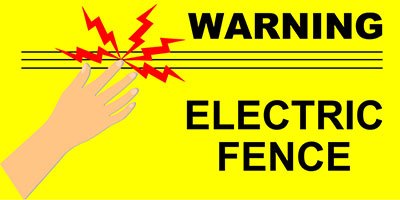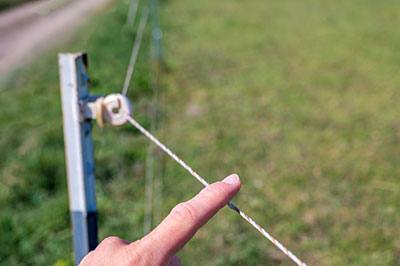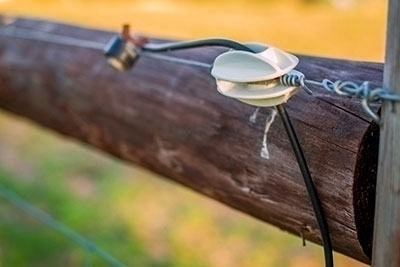Have you ever been faced with the question of whether a human can touch an electric fence? Though it may seem like a silly bit of trivia, many people are curious about this subject.
After all, humans have been using electric fencing to keep in for nearly a century – surely there must be more to this complicated puzzle than meets the eye! In this blog post, we’ll debunk the myths and discuss some common dangers associated with handling or touching an electric fence.
Whether you’re deciding if one is right for your home or farm, are simply wondering about how safe they are, or are fascinated by electricity and its potential hazards – read on to learn more!
Take away key points:
- Touching an electric fence leaves trauma to the body such as vivid and painful memory, damage of the nervous system, cardiac arrest, and an overall unpleasant feeling.
- According to European legislation regarding fences accessible to the general public, the fence’s owner is required to place an internationally recognized warning sign at the start, end, and every 50 meters along the fence.
Table of Contents
- Can a human touch an electric fence?
- What to do if you accidentally touch an electric fence?
- Can an electric fence kill you?
- The science behind electric fences
- Potential dangers of electric fences
- Safety precautions to take
- FAQs
- What happens if a human touches an electric fence?
- Can you touch an electric fence with rubber boots?
- Can you touch the electric fence with wood?
- Can an electric fence hurt a child?
- Can you touch an electric fence with rubber gloves?
- How painful is touching an electric fence?
- What to do after being shocked by electric fence?
- What happens if you pee on an electric fence?
- Final words
Can a human touch an electric fence?
Yes, a human can touch an electric fence. However, touching an electric fence can result in a painful electric fence shock.
The voltage of an electric fence typically ranges from 2,000 to 10,000 volts, which can cause pain, muscle contractions, and potentially heart problems in people with underlying heart conditions. The steady voltage keeps the muscles of your body locked and you can physically clamped to the wire.
If a human were to touch electric fencing while wet or standing in water or wet grass, even the low-voltage shock could be more severe.
To avoid the potential dangers of electric fencing, it is important to take safety precautions, such as wearing rubber gloves and boots when handling or working on an electrified fence and keeping children and pets away from it.
Oftentimes, accidental head and neck contact can occur when working in the field or when pushing a voltage probe when checking voltage range and cause an electric shock to the human body.

What to do if you accidentally touch an electric fence?
– Stay calm and move away from the fence: It’s important to break contact with the electrified wire as soon as possible. However, don’t panic and try to pull away rapidly, as this can cause further injury.
– Check for injuries: Check yourself for any injuries, burns, or deep cuts. If you have any injuries, make sure to clean and properly dress them as soon as possible.
– Observe your symptoms: If you are experiencing any unusual symptoms like muscle weakness, abnormal heart rhythms, breathing difficulty, or chest pains, call emergency services or seek medical attention immediately.
– Ground yourself: To discharge any remaining static electricity in your body, touch the ground with your feet, preferably on a grassy surface.
– Seek medical assistance: Even if you don’t experience any immediate symptoms, it’s advisable to seek medical attention as a precautionary measure. Depending on the severity of the electrical shock, a doctor may recommend tetanus shots or prescribe treatment for any burns or injuries you may have sustained. If a pregnant woman touches the electric fence, she should seek medical assistance immediately!
Can an electric fence kill you?
Yes, an electric fence can potentially kill a person. The voltage of an electric fence can range from 2,000 to 10,000 volts, which is enough to cause severe harm or even death if the voltage is high enough and if the contact is sustained long enough.
Factors such as the person’s health condition, age, and the duration of the contact can significantly impact the severity of the injury or outcome. A person with preexisting serious health conditions can be more susceptible to severe consequences from electric shock.
The science behind electric fences
Electric fence works by using an electrical charge to send an electrical shock pulse through a wire and into the ground. The energy pulses creates a high-voltage electrical charge on the wire (just like in all electrical appliances), which is enough to give a person or animal a painful shock when touched.
Modern electric fence energizers utilize low impedance circuitry that incorporates a solid-state circuit to charge a capacitor.
The voltage delivered typically ranges depending on the electric fence model. The high voltage shocks are not meant to be lethal but they can be powerful enough to cause muscle contractions, burns, and even heart problems if a person has underlying heart conditions that could be exacerbated.
Electric fence energizers produce a high voltage of approximately 8,000 volts, which creates a noticeable spark. However, they lower the amperage to a safe level of approximately 120 milliamps (varies depending on the manufacturer). To put it into perspective, normal mains electricity is 13 amps.
Although the number may seem low, even the low amps are considered deadly amps, while the severity of the shock depends on number of factors.
This high electrical current with high amperage are used to power machinery.
The effectiveness of electric fences depends on a few factors, including the voltage of the fence, the type of charger used, the kind of fencing material, and how well the fence is grounded.
Potential dangers of electric fences

While electric fences are generally safe, there are some potential dangers associated with them. One of the biggest dangers is the risk of electrocution, especially if the fence comes into contact with a power source, such as a downed electrical wire.
Additionally, touching an electric fence can result in a painful shock, which can cause muscle contraction and keep your muscle locked, burns, or even serious heart problems if the person has a pre-existing heart condition.
Another potential danger of electric fences is their effect on wildlife. Electric fences can pose a serious risk to larger animals, such as deer, bears or elk, that may be injured or killed trying to navigate or jump over the fence.
Finally, there is a risk of fire if the electric fence charger malfunctions or if vegetation grows too close to the fence. In dry conditions, a spark from the fence could ignite dry grass or other vegetation.
Safety precautions to take
To reduce the potential dangers of electric fences, it’s important to take safety precautions when working with them. The following are some safety measures to take when around electric fences:
– Be aware of your surroundings: In any situation where you are working around an electric fence, it’s important to stay aware of your surroundings. Make sure you take note of any potential hazards that could cause damage or injury.
– Avoid touching the fence: Never touch an electric fence with any part of your body, especially with your bare hands. Wearing non-conductive gloves and boots can help prevent accidents.
– Install warning signs: It’s important to post warning signs near the electric fence to remind people of the potential danger and keep them aware of the surrounding area in order to avoid safety risk.
– Ensure proper grounding: The fence must be properly grounded, and regular checks must be done to ensure that the fence is well-grounded.
– Regular maintenance checks and repairs: Regular maintenance checks are essential to keeping electric fences in good condition. Repairs should be made promptly if there is any damage to the fence.
FAQs
What happens if a human touches an electric fence?
When a human touches an electric fence, a brief but painful electric shock is felt. The shock can cause muscle contractions, burns, and potentially heart problems if the person has a preexisting heart condition that can be exacerbated.
The continuous supply of electricity from mains power can lead to a dangerous situation known as the grabbing effect, where the person who is affected by the electrical current is unable to let go of the source of the electricity.
Can you touch an electric fence with rubber boots?

Rubber is a good insulator of electricity, which means that wearing rubber boots may help to protect against electric shocks from an electric fence.
However, it’s important to note that even with rubber boots, it’s still possible to get an electric shock if the voltage of the fence is high enough.
Can you touch the electric fence with wood?
No, it is not safe to touch an electric fence with wood as it is a conductive material that can easily allow electricity to pass through.
Touching an electric fence with any sort of conductive material, including metal, can lead to an electric shock or even electrocution.
It’s important to avoid touching electric fences with anything other than non-conductive materials, such as rubber gloves and boots, to avoid the risk of injury or death.
Can an electric fence hurt a child?
Electric fences can be harmful to children if the proper safety precautions are not taken. The voltage of an electric fence can range from 2,000 to 10,000 volts, depending on the model and charger used, which is enough to cause a painful shock to anyone who touches it.
Electricity can be dangerous due to the strength of the pulsating current and the fact that it remains connected. The volume of the amperage component and the constant connection is what make electricity dangerous.
Can you touch an electric fence with rubber gloves?
Wearing rubber gloves may provide some protection against an electric shock from electrical fencing. Rubber is a good insulator of electricity, which means that the gloves should prevent electricity from passing through to the person wearing them.
How painful is touching an electric fence?
The level of pain can vary depending on factors such as the voltage of the fence, the area of the body that comes into contact with the fence, and the duration of the contact. In most cases, the pain subsides fairly quickly, and there are typically no long-term effects as long as there are no complications.
What to do after being shocked by electric fence?
After experiencing an electric fence shock, you should get off the fence, look over any wounds, ground yourself, keep an eye on your health, and seek medical attention if necessary. Taking proper safety measures is the best way to prevent an electric shock.
What happens if you pee on an electric fence?
Urine can conduct electricity, and the voltage of an electric fence can range from 2,000 to 10,000 volts, which is enough to cause severe harm. It’s essential to take proper safety precautions when working around electric fences to avoid accidental contact, which can be painful and pose a significant risk to one’s health.
Final words
Working around electric fences can be risky, but with proper safety measures in place, the chances of getting injured can be minimized. Always be cautious and aware of your surroundings when working around electric fences. Remember to avoid human exposure to the fence, wear non-conductive gloves and boots, and ensure that warning signs are posted in the area.
If you come into contact with an electric fence, take the recommended steps to ensure your safety, such as removing yourself from the fence, checking for injuries, grounding yourself, monitoring your health, and seeking medical assistance if needed.

